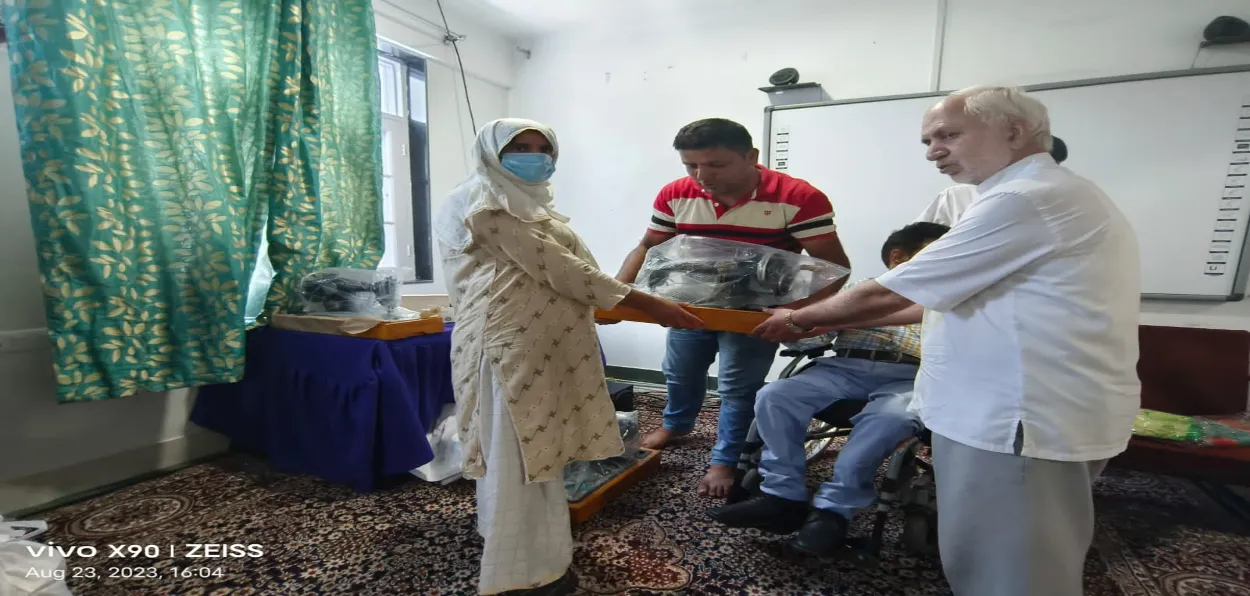
Ehsan Fazili/Srinagar
Charity is one of the main practices associated with Islamic festivals like the coming Eid-ul Adha. In tune with this, the Islamic Relief and Research Trust (IRRT), an NGO based in Srinagar that runs two orphanages in the Valley, is planning to distribute the meat of 40 sheep among the poor people. The animals have been purchased with the help of donors.
As such the IRRT runs Darul Ehsan, an orphanage for boys in Budgam, and Darul Muhsinat for girls in Baramulla. Both have 25 inmates and they are looked after and provided good education. It's working on opening a day-care center for senior citizens in Srinagar.
Abdul Rashid Hanjura, the founder of the IRRT told Awaz-the Voice that although his organization supports many destitute women through financial help and also goods throughout the year, “We are planning the distribution of Qurbani meet (sacrificial sheep on the occasion of Eid-ul-Adha) to the poor people living in far-flung areas of Budgam district and some other places”.
He says its volunteers have already distributed ration kits among the women who are running the family after the death of their husband.
The Trust also sponsors girls’ education and meets the expenses of their weddings and buying medicines for the needy.
Hanjura said, that in the last 20 years of his social work, he has observed that the IRRT's campaign gets a fillip during Ramazan with copious Zakat and Sodaqat donations. During this Ramzan, which fell in March, it held donation camps in the premises of its twin orphanages at Kralpora, Budgam, and at Singhpora, Baramulla, and also in Anantnag to cater to South Kashmir.
People taking food from IRRT's camp offices
Hanjura says, nearly 2000 people received packets of ration and clothes from the IRRT during Ramzan.
Speaking with Awaz-the Voice, Hanjura said that all the beneficiaries are first verified through documents and personal checks. The IRRT raises funds through donations.
“All this is being done strictly by the tenets of Islam, which teaches us to help the poor, needy, destitute, and the orphans”, said Abdul Rashid Hanjura, who is an advocate by profession.
IRRT, he says, is also involved in “many other activities which promote peace, harmony, development, and prosperity among communities….we are committed to minimizing the sufferings of marginalized people.”
Hanjura said his native village, Hanjura, about 22 km from Srinagar, was so peaceful and people helped each other. The village is located in the Chadoora area of Budgam district, where Muslims and Kashmiri Pandits lived together.
“Teachers in the school, both Muslims and Pandits, explored and developed a sense of social service among the students. One such example was the collective works of labour, known as “Halle Sheeri” or voluntary basis, in which the locals jointly undertook small works like developing village pathways, etc., instead of waiting for Government intervention.’
Abdul Rashid Hanjura recalls his neighbour Damodhar Bhat Hanjura, a Hindu, who had a Law degree from Lahore, was respected for his professional acumen and his nature of helping others. He said his parents were so impressed by him that they also wanted their son to be an advocate.
Kashmiri Muslims praying on the occasion of urs of Shah-e-Hamdan (Basit Zargar)
Recalling his childhood friend Maharaj Krishan Hanjura, M K Hanjura, Registrar of the Supreme Court of India, he says “We graduated together from the University of Kashmir. Interestingly, the entire population of the village, including Hindus who left in the wake of violence in Kashmir in the late eighties continues to use Hanjura as their surname. Abha Hanjura, a Sufi singer is one such example.
Another local Hindu, Raghunath Hanjura, was in charge of all the arrangements for his wedding a few years before the community left Kashmir en mass.
As part of its social activities, the IRRT has also been maintaining “communal harmony and brotherhood” among different communities living here. “We have organized inter-faith dialogue with different communities by way of meetings with members of other communities including KPs, Sikhs, and Christians” to instill confidence among the people, Abdul Rashid Hanjura said.
The Trust is organizing and conducting seminars and conferences “on certain issues for generating knowledge and providing information to the society”. It is also setting up a day-care center for senior citizens in downtown Srinagar.
He says the spirit of social and communal harmony imbibed in their school years influenced students like him. During his socio-cultural shows, he met writer and poet, Abdul Khaliq Taak, alias Taak Zainagaree in 1980.
Taak had already established J&K Yateem Trust to help the poor and orphans, and Hanjura associated himself very closely with it.
However, during the early years of mayhem and armed militancy in Kashmir, and after the death of Zainagaree, Hanjura felt the need to expand the activities of the trust. He got the the J&K Yateem Trust registered as Islamic Relief & Research Trust (IRRT), Kashmir in 2000.
ALSO READ: Eid al-Adha: Madani asks Muslims not to share images of animal sacrifice
Today, besides helping poor people enjoy the festival, the IRRT also provides wedding kits comprising bridal trousseau to women, and monthly financial help to single mothers.
